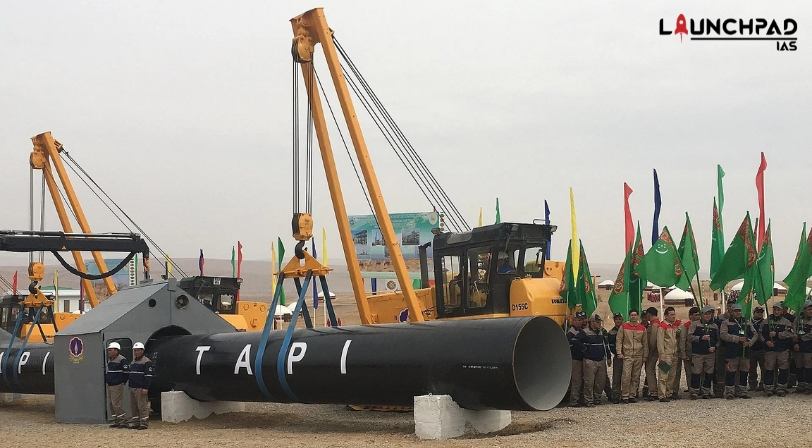About TAPI Pipeline:
- It is a 1,814-kilometre pipeline that aims to transport 33 billion cubic meters of gas from Turkmenistan to Afghanistan, Pakistan, and finally, India.
- It is also called the ‘Peace Pipeline’.
- Route:
- It will start from the Galkynysh gas field in Turkmenistan.
- It will then pass through Afghanistan and Pakistan to finally reach the Indian town of Fazilka (near the Indo-Pak border).
- Capacity: At full capacity, the pipeline will transport 33 billion cubic meters (bcm) of natural gas annually from TKM to respective buyers in AFG (5%), PAK (47.5%) and IND (47.5%) during the 30-year commercial operations period.
- The Project comprises the procurement, installation and operation of the pipeline and related facilities within Afghanistan and Pakistan.
- Timeline:
- The project was originally conceived in the 1990s, and an inter-governmental agreement was signed in 2010 by the heads of four member nations.
- A Gas Pipeline Framework Agreement was signed in December 2010, and a bilateral gas sale agreement was signed in May 2013.
- In February 2018, a ground-breaking ceremony for Afghanistan’s section of the TAPI gas pipeline was held in the western Afghan city of Herat.
- Financing:
- The TAPI project is being funded by the Asian Development Bank (ADB), which is also acting as a transaction adviser for the development.
- Turkmenistan took a loan of $700m from the Islamic Development Bank to finance the project in December 2016.
- The remaining three countries made an initial investment of $200m in the TAPI project
What is in for India?
- India will benefit a lot as it will receive 38 million standard cubic meters of gas per day improving India’s energy security.
- New opportunities for the development of gas and engineering industries of the countries involved in the project.
- The project will also help to foster regional connectivity between the countries involved, thus resulting in regional integration.
What are the Obstacles to the TAPI pipeline?
- Regional instability, especially in the AF-PAK region continues to haunt the pipeline. The planned route of the 1800 km pipeline will pass through 735 km of southern and western Afghanistan, regions which are hotbeds of terrorism. Moreover, with the proposed withdrawal of NATO (especially US) forces from Afghanistan, the ability of Afghanistan to maintain its security comes into question.
- The pipeline will also pass through Pakistan’s southwestern Baluchistan Province, a region suffering from separatist and sectarian violence for the past 9 years. Moreover, poorly guarded oil/gas pipelines in the region have been the favorite targets of ethnic Baluch separatists fighting the Pakistan army.
- Any unexpected rupture in Indo-Pakistan relationships can put the TAPI project in jeopardy.
- A lot of money is needed to finance this project. The cost of the project is estimated to be 12 billion Dollars. Asian Development Bank has already provided a few million Dollars as technical assistance, however, more money is required to finance this costly project, which is difficult to get as foreign investors (MNCs, oil companies) are wary of investing in the AF-PAK region.

Related Links: MEKONG GANGA COOPERATION


